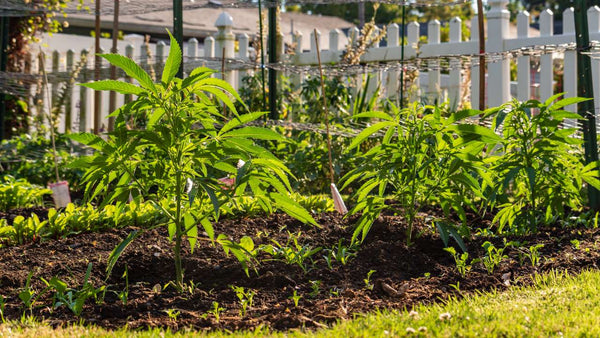There have been many advances in the legalization of hemp over the last few years. Across the country and across the world, restrictions have loosened, and more and more products have entered the market.
But the biggest step forward for the hemp community came in 2018 with the passing of the Farm Bill.
What did the 2018 Farm Bill do?
This was one of the first times Congress included the cannabis plant in its agricultural legislation in a positive way. This bill opened the door for the mass-legalization of hemp and the many possibilities of new products to finally hit the mainstream market.
The bill effectively removed hemp from the Controlled Substances Act, which had been a huge hurdle for decades. Before the bill, hemp was considered a dangerous, controlled substance. As a result, not only did hemp come with legal restrictions, it also had a negative connotation that kept it from being widely accepted.
After it was passed into law, however, hemp growers across the country were left with a myriad of agricultural, and ultimately economic, opportunities.
What exactly is the Farm Bill?

Farm bills are a piece of legislation passed into law and updated every 5 years. It’s the primary agricultural and food policy tool of the federal government, providing guidance, restrictions and programs for the growing, trading, transporting and selling of agricultural products.
The Farm Bill of 2018 was a game-changer, however, for its groundbreaking inclusion of hemp products.
The first 9 titles of the Farm Bill encompassed legislation pertaining to general agricultural development, conservation, trading and more. But hidden deep in the articles were little lines of hope for the hemp industry.
Additionally, Title X was where the bill began delving into the grey area of hemp cultivation and sale more openly, making hemp production and sale a little less cloudy.
To give a basic overview:
Before the 2018 Farm Bill, hemp cultivation was legal through small, pilot programs. However after it was signed into law, the broad cultivation of hemp was legalized. It also allowed for the transport of hemp for commercial and non-commercial purposes across state lines. In addition, it also eliminated restrictions on the sale, transport and possession of hemp products.
There were still restrictions, however, and the Farm Bill outlined them clearly.
According to the bill, there would be a THC threshold. That meant that if a plant contained more than 0.3% of THC, it was considered a non-hemp cannabis plant and was therefore not protected by the new bill.
In addition to the obvious restrictions the bill still put in place, it also set out a strict set of rules and regulations to punish those that did not comply -- whether their plants contained too much THC or they tried growing without a license.
Lastly, the bill left it up to each individual state to decide what the formal hemp approval process was. It was now up to each state’s government to put together a plan for the cultivation and sale of hemp within its borders.
As of 2020, commercial hemp cultivation, research and pilot programs are legal in 48 out of the 50 states. The areas where hemp isn’t allowed are Idaho, Mississippi and Washington D.C.
What about CBD?

Even with these restrictions, this legislation was great news for the hemp community -- it was now easier than ever before to grow and sell hemp products.
But there was still no clear answer on where CBD stood.
That’s because there was no clear guidance on the cultivation of CBD, which is derived from hemp.
With the passing of this bill, many thought that CBD cultivation would be just as legal. But the wording of the law kept CBD just out of reach.
According to Bob Hoban, an experienced hemp attorney, the Farm Bill, “legitimized hemp as an agricultural crop as opposed to a drug/controlled substance. However, while this legislation paved the way for the hemp industry’s expansion it in no way made the path to legal compliance any clearer for those in the hemp industry.”
That begs the questions -- is CBD legal, and where?
Is CBD legal in your state?
As of 2020, most states have legalized CBD in some form. The three that haven’t legalized it in any form are Iowa, Idaho and South Dakota. But even then, the states that have loosened restrictions still keep CBD on a tight leash.
For many states, it is still illegal to sell CBD in readily ingestible food & beverage form. This makes it even more difficult for companies to expand market by market with a clear roadmap.
All that said, big movement is expected over the coming months as final federal regulations are put in place around the manufacture and sale of all CBD products.
Where do we go from here?

The Farm Bill gave all the power to the states. But that doesn’t mean the fight has gotten any easier. While the federal government might have loosened its iron grip on the hemp industry, there are still questions growers are seeking answers for.
Even with its shortcomings, however, the 2018 Farm Bill was influential in moving the legalization movement a step further. The bill opened up a number of opportunities for growers to legitimize and thrive.
The Farm Bill gave growers a clearer path to get their product to market. It established a series of regulations to give hemp legitimacy and it continues to pave the way for the legalization of CBD and marijuana across the country.
Of course, there is still work to be done. Without clarity on CBD, many states have been slow to legalize and allow the sale of CBD products.
But hemp and CBD use are on the rise -- just look at the numbers! A new report shows that the global valuation of cannabidiol will reach $89 billion by 2026.
Industrial hemp and CBD sales are on the rise. This is a positive insight that we can’t take away from the bill. And there are now more opportunities for small and large-scale growers to make a living.
As more states take steps to loosen restrictions and move towards complete legislation, we can start carving out a real path towards booming success for the hemp and CBD industry...and who knows what the next Farm Bill will bring.
For a more in-depth introduction into CBD, check out our CBD 101 page.



